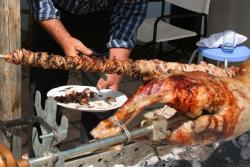Greek Orthodox Easter
This year the Greek Orthodox Easter falls on Sunday 2nd May. Easter in Greece is the most celebrated festival throughout the whole year, commemorating not only the crucifixion and resurrection, but Easter is also considered to mark the passing of Winter to Spring. Last year Easter was 'cancelled' due to the developing Covid-19 pandemic, this year there will be limited celebrations in churches and homes throughout the country. In Greece, Orthodox Easter is celebrated with an entire week of festivities, titled The Holy Week, beginning with Palm Sunday on 25th April. Good Friday, Easter Sunday and Easter Monday are celebrated as public holidays, with Easter Tuesday also being a public holiday due to the Easter period including the May Day holiday. All stores will be closed on Sunday, Monday and Tuesday.
As there will be a curfew between 10:00pm and 05:00am during The Holy Week, then most church services will start earlier than usual. Good Friday is considered to be a sacred day in Greece, however, this year Christ's funeral bier, the epitaphios, will not be carried through the surrounding streets due to the nationwide restrictions. Easter Saturday, known as the The Resurrection or Anastasis will this year begin at 9:00pm, not 11:00pm as usual. This is when the priest appears holding a lighted Holy candle reciting the phrase Avto to Fos which means 'This is the Light', the light of this candle is then spread throughout the gathering faithful. The crowd offers the salutation Christos Anesti, 'Christ has risen' to each other, which is responded by Alithos Anesti, 'He has truly risen'. The service will end at 10:00pm.
 The people then return to their homes, to the festive tables, and break with their fast with the traditional Maghiritsa soup. After this meal, the family will crack red Easter eggs, which are dyed red to exemplify the blood of Christ. The shell of the egg is said to replicate the sealed tomb of Christ, cracking the eggs illustrates the resurrection. Everyone is up early next morning to prepare for the Easter Sunday dinner. This Sunday dinner is a feast of lamb served in honour of the lamb of God. The lamb is usually roasted on a spit outside, usually accompanied with kokoretsi, and the entire day is celebrated with food, wine, music, singing and dancing. Easter Monday is considered to be a day of rest and relaxation after the week long festivities. Most Easter festivities will be limited due to the Covid-19 restrictions.
The people then return to their homes, to the festive tables, and break with their fast with the traditional Maghiritsa soup. After this meal, the family will crack red Easter eggs, which are dyed red to exemplify the blood of Christ. The shell of the egg is said to replicate the sealed tomb of Christ, cracking the eggs illustrates the resurrection. Everyone is up early next morning to prepare for the Easter Sunday dinner. This Sunday dinner is a feast of lamb served in honour of the lamb of God. The lamb is usually roasted on a spit outside, usually accompanied with kokoretsi, and the entire day is celebrated with food, wine, music, singing and dancing. Easter Monday is considered to be a day of rest and relaxation after the week long festivities. Most Easter festivities will be limited due to the Covid-19 restrictions.
From Holy Thursday, 29th April, through Easter Sunday, people will be allowed to move between municipalities within the region of their permanent residence. Travelling to another prefecture is still not permitted, with Police checks at most roads and highways.
Retail stores will open on Good Friday from 1:00pm until 7:00pm. On Holy Saturday from 7:00am until 6:00pm. Supermarkets will open on Good Friday from 9:00am until 7:00pm. On Holy Saturday from 7:00am until 7:00pm. All retail stores, supermarkets and shops will be closed on Easter Sunday, 2nd May, Easter Monday, 3rd May and Easter Tuesday, 4th May.
Only members of two families will be allowed to gather for the Easter Sunday meal, with no more than 9 people indoors and 12 people outdoors. Individuals will have to send SMS to 13033 code 6 for movement on Sunday. Must be back home by 10:00pm.
On Easter Monday 3rd May individuals will be able to dine outdoors at restaurants and cafes by sending an SMS to 13033 code 6. Customers must be seated and no music will be allowed to play, with premises to close at 10:45pm at the latest. From Monday, the nationwide curfew will begin from 11:00pm until 5:00am. People will continue sending texts for movement at least until 14th May.